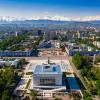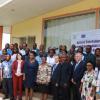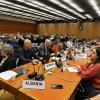News
Displaying Results 51 - 75 of 1268
Four years ago, when the COVID-19 pandemic hit, it disrupted the normal functioning of open markets. The ensuing crisis had crippling effects on global trade and productive capacities: it broke supply chains, reduced connectivity and slowed the flow of essential goods. Global food and energy…
The raw materials sector is at the forefront of global challenges and opportunities of the 21st century, as it plays a vital role in the energy, transport, and digital transitions required to mitigate and adapt to climate change. However, the sector also faces significant pressures from consumers,…
The impact of different air pollutants on vegetation and crops has been studied for over 35 years in the framework of the UNECE Convention on Long-range Transboundary Air Pollution, through its International Cooperative Programme on Effects of Air Pollution on Natural Vegetation and Crops (ICP…
In recent years, Montenegro and its capital city, Podgorica, have been committed to accelerate sustainable and smart urban development through a variety of ambitious national and regional and local measures, such as digitalization of public services, modernization of public transport, and to…
The Sustainable Development Goals (SDGs) require a massive transformation of our economies and societies, and a shift towards more sustainable patterns of production and consumption. Public-Private Partnerships (PPPs) are a powerful tool to support this transformation, as they can mobilise private…
Would you trust artificial intelligence (AI) in your heart? This is not some imaginary, science-fiction scenario. Biomedical companies are already developing pacemakers embedded with AI. Digital technologies like AI are also opening new possibilities such as improved management of natural resources…
The transport sector is responsible for 23% of global greenhouse gas emissions, with road transport accounting for around 77% of these emissions. As populations, economies, and the need for mobility grow, the World Bank estimates that greenhouse gas (GHG) emissions from transport could increase by…
Ensuring the principles of environmental democracy are upheld in relation to modified organisms/genetically modified organisms (LMOs/GMOs) can help countries to address biodiversity loss and support progress on a number of Sustainable Development Goals, in particular Goals 2 (zero hunger), 15 (life…
Sierra Leone shares four major rivers with the neighbouring countries of Guinea and Liberia, including the Great Scarcies, Little Scarcies and Moa shared with Guinea, and Mano River shared with Liberia. All provide crucial freshwater that sustains ecosystems, livelihoods and the well-being of…
UNECE has today released a detailed inventory of Thematic and Extended Accounts.
This new resource offers comprehensive insights into the economic accounts published by countries worldwide that expand on the classical measures included in core national accounts.
The System of National…
At the World Economic Forum Annual Meeting in Davos, UNECE Executive Secretary Tatiana Molcean highlighted the role of UNECE’s legal instruments, standards and tools in dealing with the most pressing global challenges, namely climate change, digital and green transformations, low-carbon energy…
Burkina Faso is one of the Sahelian countries hardest hit by the effects of climate change, experiencing torrential rains and floods, as well as periods of insufficient rainfall.
To help address these challenges, through adaptation, resilience and concerted, shared management of its water…
In recent years, the participating States of the United Nations Special Programme for the Economies of Central Asia (SPECA) - Afghanistan, Azerbaijan, Kazakhstan, Kyrgyzstan, Tajikistan, Turkmenistan, and Uzbekistan - have observed rapid growth in the number and impact of business incubators and…
The Government of Ukraine is committed to rebuilding its infrastructure with a focus on achieving the Sustainable Development Goals (SDGs) and pursuing a resilient, inclusive and sustainable recovery.
However, the reconstruction and recovery needs of Ukraine are enormous and were estimated by…
Originally introduced in policy and development discussions in 2011, the water-food-energy-ecosystem nexus approach has evolved into a pivotal framework for sustainable development and achieving the Sustainable Development Goals (SDGs).
Work on the water-energy-food-ecosystems nexus under the…
Infrastructure is crucial for social and economic development. To achieve the 2030 Agenda for Sustainable Development, infrastructure needs to be green, climate resilient, circular, inclusive and fiscally sustainable, with people as the main beneficiaries. Infrastructure is also needed to rebuild…
Trade facilitation is a potent instrument that can multiply the benefits of trade. Beyond direct impact on economic growth through higher trade flows linked to improved efficiency at the borders, trade facilitation reforms can also contribute to other policy goals. For example, through the…
Cooperation and management of transboundary waters, which span over 45% of the world's surface and serve as vital resources for nearly half of the global population, face the imminent threat of underfunding. The last reporting exercise on Sustainable Development Goals (SDG) indicator 6.5.2 (2020),…
According to a recently published UNECE Policy Paper, the agrifood, the garment and footwear and the mineral sectors contribute significantly to the economic growth and employment in the UNECE region, while being major sources of global greenhouse gases (GHG) and environmental pollution. Evidence…
As the international community marks 75 years since the adoption of the groundbreaking Universal Declaration of Human Rights, UNECE calls for commitment and practical measures from governments and all stakeholders in the region to uphold the human rights of all persons including those with…
The Protocol on Pollutant Release and Transfer Registers (Protocol on PRTRs) sets international standards for reporting on pollutant releases from a range of economic activities, such as mineral industry operations, plastic production, waste and wastewater management or the rearing of poultry or…
Transparency in the environmental performance of economic activities and effective public access to environmental information, especially on products, are indispensable in addressing pressing environmental challenges. This also supports a just transition towards a green and circular economy,…
The Mediterranean Region, home to over 510 million people, is an important crossroads for economic, social and cultural exchanges between Europe, Africa, Asia and other continents. The region is rich in biodiversity, but has come under pressure due to the intensive exploitation of mineral resources…
In a rapidly evolving world, grappling with climate change and the triple planetary crisis, transformative innovation stands as a crucial solution to these pressing challenges. Strategic learning is increasingly recognized as a key component in both ecosystem development and the broader realm of…
Discussions at the recent 33rd annual session of UNECE’s Working Party on Regulatory Cooperation and Standardization Policies (WP.6) focused on how to target continued compliance of products with embedded artificial intelligence, reflecting the importance and the challenge that such products can…
























